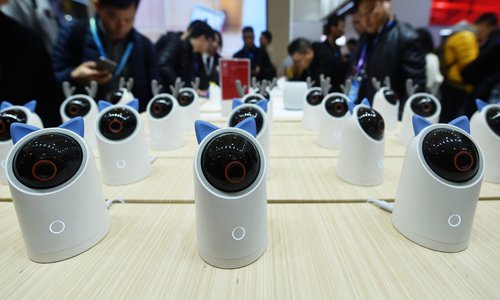HOME >> CHINA
Top education authority pledges to limit use of facial recognition systems in schools
By Cao Siqi Source:Global Times Published: 2019/9/5 20:18:41

Visitors take a look at smart panoramic cameras displayed at Huawei's booth during the 2019 China Appliance & Electronics World Expo on Thursday in Shanghai. The event, which ends on Sunday, features advanced technology such as artificial intelligence. Almost 900 domestic and foreign enterprises are taking part in the expo. Photo: VCG
China's top education authority on Thursday pledged to limit and regulate the use of applications with AI-powered facial recognition technology in campuses and said it hopes schools will adopt such systems prudently.The comments came after a picture went viral online showing that a college was testing a facial recognition system, which could monitor and analyze students' behavior in class.
The system was developed by the Beijing-based company Megvii. The company says that its software is able to detect and analyze all kinds of body and facial movements at school and in the classroom - from the more obvious raising of a hand to the more subtle assessment of how much a student is paying attention to a teacher.
The system quickly triggered uproar online with many saying that it is an invasion of students' privacy.
Although the company issued a statement saying that the picture was simply used to advertise its products and that the products protect children's safety, it did not convince internet users.
Megvii's system is just one of various forms of software with similar functions in Chinese campuses. The technology, which was intended to strengthen security and prevent school bullying, is driven by market forces with an increasing number of technology companies rushing to offer functions that monitor and manage students by analyzing in detail their class behavior.
Lei Chaozi, director of the department of science and technology under the Ministry of Education, told news site thepaper.cn on Thursday that facial recognition technology in campuses contains both data security and personal privacy issues. The ministry is paying attention to the situation and is organizing for experts to research it.
"We must be very cautious about any data that includes students' personal information, especially data related to biology," Lei said.
The ministry, together with other ministries, issued guidelines for regulating the development of education based on internet services on Thursday, which stipulate that the collection of minors' information should be approved and authorized by their guardians.
Reports circulated early in 2017 that many primary and middle schools were installing surveillance cameras and that by downloading an app, a parent could know what their child was doing in class.
Last year, more than 10 schools in Southwest China's Guizhou Province and Guangxi Zhuang Autonomous Region applied "intelligent uniforms" to monitor student attendance and location.
"When technology has gone too far and the legislation lags behind, we need a 'third force' to resolve the contradiction, which is moral ethics. Technological progress must be bound by morality," Zhu Wei, a professor at the China University of Political Science and Law, told the Global Times.
Monitoring teachers and students in class will result in teachers losing their authority and also poses the risk of leaking minors' sensitive information. It is unethical, Zhu said, calling for a halt to the use of such systems in campuses.
RELATED ARTICLES:
Posted in: SOCIETY